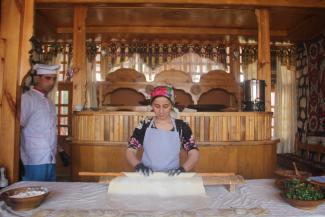Women Showcase Tajik Hospitality through Traditional Cuisine and Handicrafts
Sharifa Rahmonzoda is known among her family and friends as a great cook. She has plenty of practice–between managing her home and raising her three children, she is often in her kitchen preparing traditional Tajik dishes like plov, mantu, and tushbera. When a local teahouse, Sayokhat Chaykhana, advertised a cooking competition, her neighbors immediately thought of Sharifa.
“Initially, I wasn’t interested,” remembers Sharifa. “I didn’t know what to expect, but then I decided to go after all. It is difficult to find work in our remote region, and I thought maybe it was an opportunity to get a job.”
Sharifa interviewed at the teahouse the next day, describing herself and the reasons she loves to cook. A team from Panjakent Intour told her that the competition was part of a project implemented jointly with USAID’s Future Growth Initiative to develop a “Gastronomy Tour” – a new program for tourists to experience the region’s culture through its traditional cuisine. Ten women had been selected to undergo additional training to participate in the project.
“At the beginning, I was surprised, since every Tajik woman knows how to cook national dishes, but luckily they chose me,” says Sharifa. “After a short discussion with my family, I decided to participate in the training. It took place at the Sayokhat Teahouse and was led by one of the most famous chefs in Panjakent, Devashtich Sharifbadalov.”
The training not only introduced the winners to new ways of cooking, but also to the cultural history of traditional food. “I was surprised to hear the stories and learn the secrets of some national dishes,” laughs Sharifa.
Gastronomy tours are gaining popularity among tourists globally, as travelers seek out authentic ways to experience other cultures. Food lovers travel the world exploring new cooking styles, tastes, ingredients, and rituals – and Central Asia is no exception.
After the completion of the training, all of the participants were offered contracts to support gastronomy tours. When tourists arrive, a cook’s job is to demonstrate food preparation and prepare local dishes. Sharifa was also given a special opportunity. “On the final day of training, I was offered a job at the Sayokhat Teahouse. Now, I’m not only a specialist for gastronomy tours, but I also work as a cook,” she says with pride.
In August 2021, Sharifa held a master class for a press tour organized by Panjakent Intour. Enthusiastic journalists, bloggers, and travel company representatives watched Sharifa skillfully prepare traditional Bichak pastries (usually stuffed with pumpkin or meat) on a fire. “This was my first experience working with such a large audience. I think I managed it well,” says Sharifa.
Although only a few tourists had arrived in the region due to the COVID-19 pandemic this year, Panjakent Intour remains optimistic that the situation will improve next season. An uptick in tourism will mean more work opportunities for women living in the highland region.
Through the USAID-supported project, ten women took classes on cooking national dishes, and another ten women learned how to make traditional crafts for the Sayokhat Chaykhana souvenir shop. All of them are now busy working through the peak of the tourist season.
“Thanks to USAID, I have an additional source of income and can help support my family. I have found my purpose in life–something that I love to do,” says Sharifa. “I am happy that I can contribute to the development of tourism in my region and in the country as a whole.”
Thanks to the support from USAID, tourism in mountain villages continues to create new opportunities for local residents. With the growth of the tourism sector and the opening of new guest houses, cafes, and souvenir shops, Panjakent Intour expects sales to grow by 15 percent over the year, creating and improving 60 jobs - primarily for women in Tajikistan’s mountainous regions.

